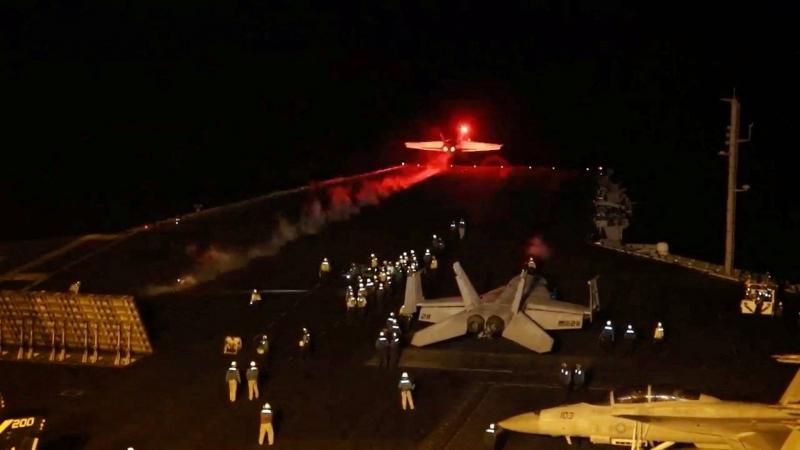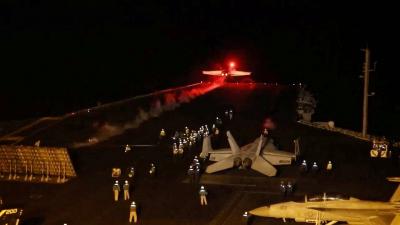Americans will not invade Sana'a, but with the increase in attacks on ships in international waters and the losses to international trade, the Houthis make themselves a necessary target and a "project" for confrontation to force them to stop, and perhaps even to overthrow their rule in Sana'a and northern Yemen. This aligns with the policy of cleansing the Red Sea of Iranian influence, which previously thwarted its military base project in Sudan.
Can the United States engage in a new war, having left Afghanistan and failed to prevent the Taliban from regaining power there? What can any other force do that is more than what Saudi Arabia and the Arab military coalition have done (2015-2024)? Why is the Houthi hand targeted while the mastermind is in Tehran?
The American proverb says, "You can't make an omelette without breaking a few eggs," and similarly, stopping the Houthi war on international maritime navigation will require extensive military action against them, greater than limited missile strikes. Tehran realizes that it is unlikely the current American president would risk ground operations; it is an election year, and Yemen resembles Afghanistan significantly in terms of rough terrain, and the Houthis are similar to the Taliban in their adaptability wherever they are found.
In Congress, it has become clear that intelligence on Houthi military strength is limited, and this lack has its reasons. Americans have not considered the Houthis an enemy, despite their forceful seizure of power and their alliance with Iran. Washington has not only remained neutral but has effectively protected the Houthis to some extent when it refused to cooperate with Saudi Arabia and the Yemeni legitimate government, halted ammunition supplies to Saudi Arabia, and disrupted military intelligence cooperation with them.
In this crisis, Washington recognizes that what the Houthis are doing is a result of its inaction and failure to understand the nature of the proxy militia with its anti-American regional ties. Washington has decided to confront the current Sana'a regime to deter it, and the continuation of attacks on international navigation may lead to efforts to overthrow it and remove it from Sana'a. There is an increase in American communications with Yemeni armed forces opposed to the Houthis, as well as visits by their leaders to London. These local forces could reignite the civil war, and some consider it an opportunity to launch a new round of conflict.
As for how the Houthis managed to confront Saudi Arabia and the eight-nation coalition, it is a long and complex story. In brief, the coalition, while not liberating Sana'a, was able to thwart and reduce Houthi control to less than a third of Yemen, after their forces reached Aden and then retreated. The coalition succeeded in disrupting the coup plotters as a regime and state and choking their capabilities, leading them to lack major land, sea, or air outlets, which forced them to accept negotiations and reconciliation with Riyadh, even before the Saudi-Iranian agreement by more than eight months. But the coalition certainly did not succeed in overthrowing the Houthis or restoring legitimacy. One reason is the American stance, which deprived the coalition of ammunition, halted intelligence cooperation, and launched a legal campaign aimed at forcing the coalition to restrict the war.
The Yemen war is a complex story due to the multitude of forces and the topography of the land. The new element is that the Houthis have become an international threat, and this is one of the rare crises in which China, Russia, and the West have united to condemn a specific group, making the Houthis themselves the greatest danger to global maritime trade. Confronting them will enjoy widespread support as was witnessed in the fight against Al-Qaeda.
It must be stated and distinguished that the Houthis are not like Al-Qaeda; they are somewhat similar to the Taliban, with three shared characteristics: a local movement, tribal extension, and ideological thought. However, the Houthis are a small group, comprising less than 7 percent of Yemen's population, while the Taliban may represent fifty percent tribally. The Houthis are distinguished by their ability to manage their local alliances and their military relationship with Iran and Hezbollah.
Americans, after losing Saudi support and after the reduction of the coalition, are starting from scratch and are currently exploring the weaknesses of the group and the possibility of using local forces opposed to it. The use of Kurds by Americans against Shiite militias and Masoud's alliance against the Taliban are examples of this.
All of this depends on the escalation in the Red Sea, which will limit the fighting against the Houthis and not against the real mover, Iran, as the current balances do not allow for confrontation with it at this stage.




